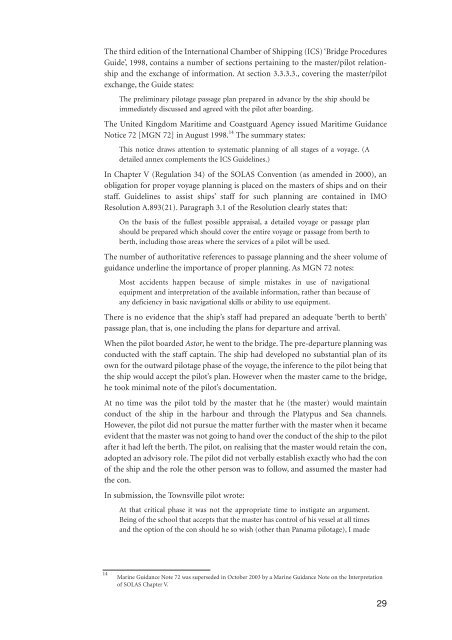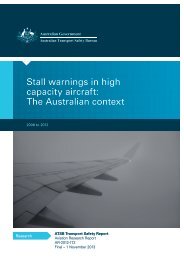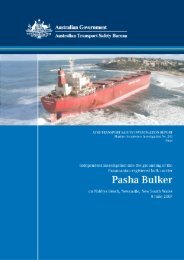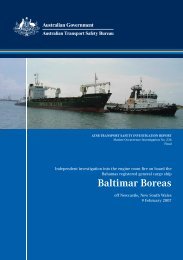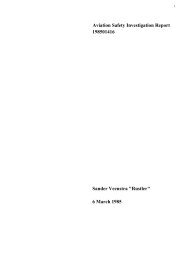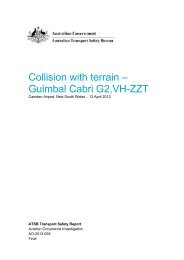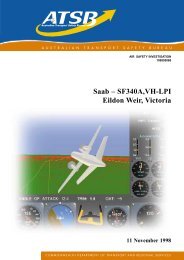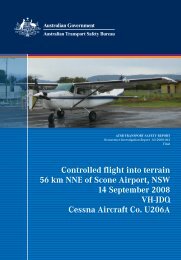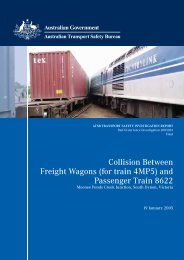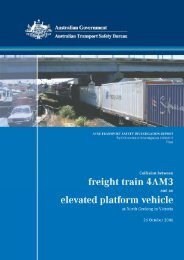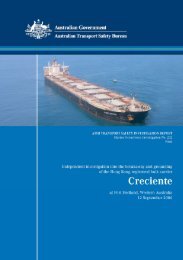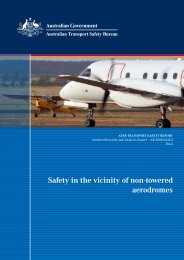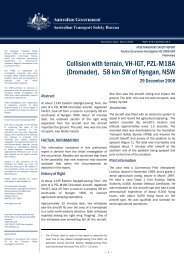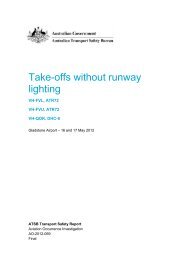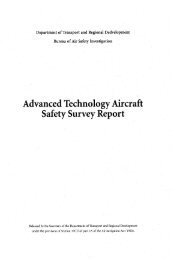MARINE SAFETY INVESTIGATION REPORT No. 200
MARINE SAFETY INVESTIGATION REPORT No. 200
MARINE SAFETY INVESTIGATION REPORT No. 200
You also want an ePaper? Increase the reach of your titles
YUMPU automatically turns print PDFs into web optimized ePapers that Google loves.
The third edition of the International Chamber of Shipping (ICS) ‘Bridge Procedures<br />
Guide’, 1998, contains a number of sections pertaining to the master/pilot relationship<br />
and the exchange of information. At section 3.3.3.3., covering the master/pilot<br />
exchange, the Guide states:<br />
The preliminary pilotage passage plan prepared in advance by the ship should be<br />
immediately discussed and agreed with the pilot after boarding.<br />
The United Kingdom Maritime and Coastguard Agency issued Maritime Guidance<br />
<strong>No</strong>tice 72 [MGN 72] in August 1998. 14 The summary states:<br />
This notice draws attention to systematic planning of all stages of a voyage. (A<br />
detailed annex complements the ICS Guidelines.)<br />
In Chapter V (Regulation 34) of the SOLAS Convention (as amended in <strong>200</strong>0), an<br />
obligation for proper voyage planning is placed on the masters of ships and on their<br />
staff. Guidelines to assist ships’ staff for such planning are contained in IMO<br />
Resolution A.893(21). Paragraph 3.1 of the Resolution clearly states that:<br />
On the basis of the fullest possible appraisal, a detailed voyage or passage plan<br />
should be prepared which should cover the entire voyage or passage from berth to<br />
berth, including those areas where the services of a pilot will be used.<br />
The number of authoritative references to passage planning and the sheer volume of<br />
guidance underline the importance of proper planning. As MGN 72 notes:<br />
Most accidents happen because of simple mistakes in use of navigational<br />
equipment and interpretation of the available information, rather than because of<br />
any deficiency in basic navigational skills or ability to use equipment.<br />
There is no evidence that the ship’s staff had prepared an adequate ‘berth to berth’<br />
passage plan, that is, one including the plans for departure and arrival.<br />
When the pilot boarded Astor, he went to the bridge. The pre-departure planning was<br />
conducted with the staff captain. The ship had developed no substantial plan of its<br />
own for the outward pilotage phase of the voyage, the inference to the pilot being that<br />
the ship would accept the pilot’s plan. However when the master came to the bridge,<br />
he took minimal note of the pilot’s documentation.<br />
At no time was the pilot told by the master that he (the master) would maintain<br />
conduct of the ship in the harbour and through the Platypus and Sea channels.<br />
However, the pilot did not pursue the matter further with the master when it became<br />
evident that the master was not going to hand over the conduct of the ship to the pilot<br />
after it had left the berth. The pilot, on realising that the master would retain the con,<br />
adopted an advisory role. The pilot did not verbally establish exactly who had the con<br />
of the ship and the role the other person was to follow, and assumed the master had<br />
the con.<br />
In submission, the Townsville pilot wrote:<br />
At that critical phase it was not the appropriate time to instigate an argument.<br />
Being of the school that accepts that the master has control of his vessel at all times<br />
and the option of the con should he so wish (other than Panama pilotage), I made<br />
14<br />
Marine Guidance <strong>No</strong>te 72 was superseded in October <strong>200</strong>3 by a Marine Guidance <strong>No</strong>te on the Interpretation<br />
of SOLAS Chapter V.<br />
29


